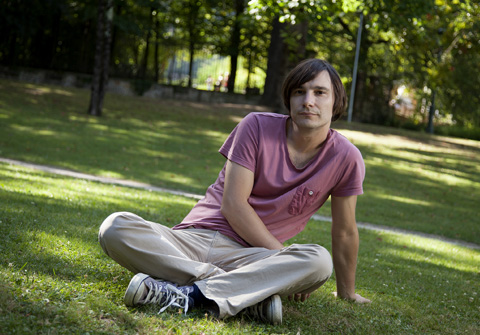Using a range of methodologies, the researcher at the UPV/EHU's Faculty of Economics and Business Gaizka Inzunza has conducted a piece of research designed to identify the main dynamics and trends in the contemporary sound recording sector and to spot possible future scenarios. The research, which had the collaboration of prestigious professionals in the sector, has concluded that the current sound recording industry is governed by more flexible consumption and a more fragmented production geography.
Rock and roll changed the production and distribution processes of the sound recording industry
The UPV/EHU-University of the Basque Country has explored the evolution of the contemporary sound recording industry by means of an analysis of the innovation processes in Europe
- Research
First publication date: 26/08/2016

Globalisation, as a new framework of socioeconomic relations linked to the development of ICTs, and the Internet and digital technologies in particular, is driving forward significant transformations in the culture industries. It is worth pointing out that the sound recording industry has been immersed in a sales crisis since the end of the 1990s. The appearance and expansion of content sharing platforms, the end of the period in which vinyl was replaced by cassettes and CDs, the economic crisis, competition from other sectors linked to technology and entertainment or the conservative strategies of the record labels are among the most salient factors when it comes to accounting for the fall in sales of recorded music.
Yet, "beyond the sales crisis, attention needs to be drawn to the qualitative changes affecting various spheres that make up the sound recording sector," said Gaizka Insunza, a researcher at the UPV/EHU's Faculty of Economics and Business, and who has analysed the innovation processes of the contemporary European sound recording industry. Insunza produced, in three phases, a broad study of the new characteristics of the production, distribution and consumption of music in the context of digital technologies and globalisation.
Following an initial phase to review the literature in which Insunza established that until now there have been numerous pieces of research that are related but with different points of view, he specified a theoretical framework to study the processes relating to innovation and technological change in the sound recording industry; this is the framework he used to focus his research on the innovations in the product, process, organisation and marketing (based on the Oslo Manual). And finally, using the DELPHI methodology, he carried out a survey among 13 professional experts with a long trajectory in the sound recording industry and which covers all the spheres specified in his theoretical framework.
A new paradigm and common ground
"I believe my research brings together many of the pieces of work that have been carried out in the sphere of the sound recording industry in recent years," said Insunza, and due to the fact that the literature has detected various contradictions, "I wanted to speak to professionals to compare these academic opinions with the opinions of the professionals who work on the European level in the sound recording sector". That way "I have obtained significant consensus and I believe I have established common ground that could help to make progress in future pieces of research without there being so many contradictions".
The researcher concluded, "I have reached the conclusion in agreement with the majority of the authors and the majority of the bibliographical references, that it can be clearly considered that a qualitative leap has taken place in terms of music production. I think this is governed by a new paradigm." Firstly, Insunza cites the intangible-ization of the product, in other words, "a qualitative change took place with mp3, because once the physical mediums have been relegated, music consumption becomes intangible", he explained. Secondly, he added that "it seems that in the new networks and in the new marketing methods the single is once again exerting greater weight over the album, which is proof that music consumption has changed enormously and that there is greater flexibility".
What is more, says the researcher, "digital processes are changing the whole music process in a significant way". The geography of production has become fragmented, with a move away from the big studios belonging to the major recording organisations. A reduction has taken place in entry barriers, thus facilitating the entry of new players. In this context, new players from computing, telecommunications plus totally new companies have gone into the music business. These companies consider that music has a great potential for generating synergies with their products and services. Finally, "despite the opportunities offered by the new paradigm, the major recording organisations continue to exert great market dominance, at least as far as sales are concerned. However, their capacity to control the supply has diminished," he concluded.
"Any technological breakthrough can transform the sound recording industry to a level that has already been seen in the past," said Insunza. "I believe that creative breakthroughs can sometimes also signify changes in the sound recording industry as occurred with rock and roll in the 1950s: that was a change in the creative sphere which later influenced the spheres of production, distribution, etc." As regards the future, Insunza believes that music consumption is more and more immediate; that music is consumed increasingly in relation to other things and that, therefore, music has to seek more and more partners, and "that is going to force all of us who like it and who work in the field of music to seek fresh ways of creating it, distributing it as well as new strategic partners".
Additional information
Gaizka Insunza (Gernika, 1978) is a graduate in Business Management and Administration. He wrote up his PhD thesis entitled ‘La evolución de la industria discográfica: Un análisis de los procesos de innovación en Europa' (The evolution of the sound recording industry: a study of the innovation processes in Europe) at the Department of Applied Economics I of the UPV/EHU's Faculty of Economics and Business; his thesis supervisors were Mikel Zurbano and Juan Carlos Miguel de Bustos.
Photos: Tere Ormazábal. UPV/EHU.





